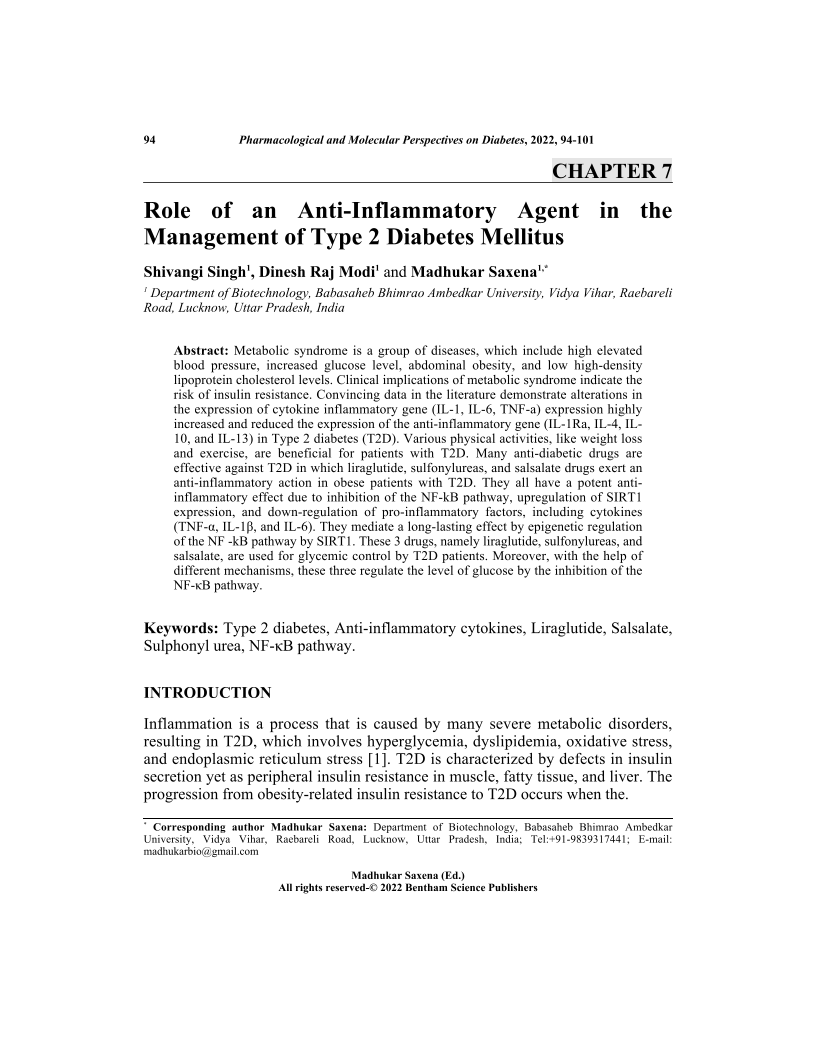Role of an Anti-Inflammatory Agent in the Management of Type 2 Diabetes Mellitus

- Authors: Shivangi Singh1, Dinesh Raj Modi2, Madhukar Saxena3
-
View Affiliations Hide Affiliations1 Department of Biotechnology, Babasaheb Bhimrao Ambedkar University, Vidya Vihar, RaebareliRoad, Lucknow, Uttar Pradesh, India 2 Department of Biotechnology, Babasaheb Bhimrao Ambedkar University, Vidya Vihar, RaebareliRoad, Lucknow, Uttar Pradesh, India 3 Department of Biotechnology, Babasaheb Bhimrao Ambedkar University, Vidya Vihar, RaebareliRoad, Lucknow, Uttar Pradesh, India
- Source: Pharmacological and Molecular Perspectives on Diabetes , pp 94-101
- Publication Date: April 2022
- Language: English
Role of an Anti-Inflammatory Agent in the Management of Type 2 Diabetes Mellitus, Page 1 of 1
< Previous page | Next page > /docserver/preview/fulltext/9789815040227/chap7-1.gif
nbsp;Metabolic syndrome is a group of diseases, which include high elevated blood pressure, increased glucose level, abdominal obesity, and low high-density lipoprotein cholesterol levels. Clinical implications of metabolic syndrome indicate the risk of insulin resistance. Convincing data in the literature demonstrate alterations in the expression of cytokine inflammatory gene (IL-1, IL-6, TNF-a) expression highly increased and reduced the expression of the anti-inflammatory gene (IL-1Ra, IL-4, IL 10, and IL-13) in Type 2 diabetes (T2D). Various physical activities, like weight loss and exercise, are beneficial for patients with T2D. Many anti-diabetic drugs are effective against T2D in which liraglutide, sulfonylureas, and salsalate drugs exert an anti-inflammatory action in obese patients with T2D. They all have a potent anti inflammatory effect due to inhibition of the NF-kB pathway, upregulation of SIRT1 expression, and down-regulation of pro-inflammatory factors, including cytokines (TNF-α, IL-1β, and IL-6). They mediate a long-lasting effect by epigenetic regulation of the NF -kB pathway by SIRT1. These 3 drugs, namely liraglutide, sulfonylureas, and salsalate, are used for glycemic control by T2D patients. Moreover, with the help of different mechanisms, these three regulate the level of glucose by the inhibition of the NF-κB pathway.
-
From This Site
/content/books/9789815040227.chap7dcterms_subject,pub_keyword-contentType:Journal -contentType:Figure -contentType:Table -contentType:SupplementaryData105

